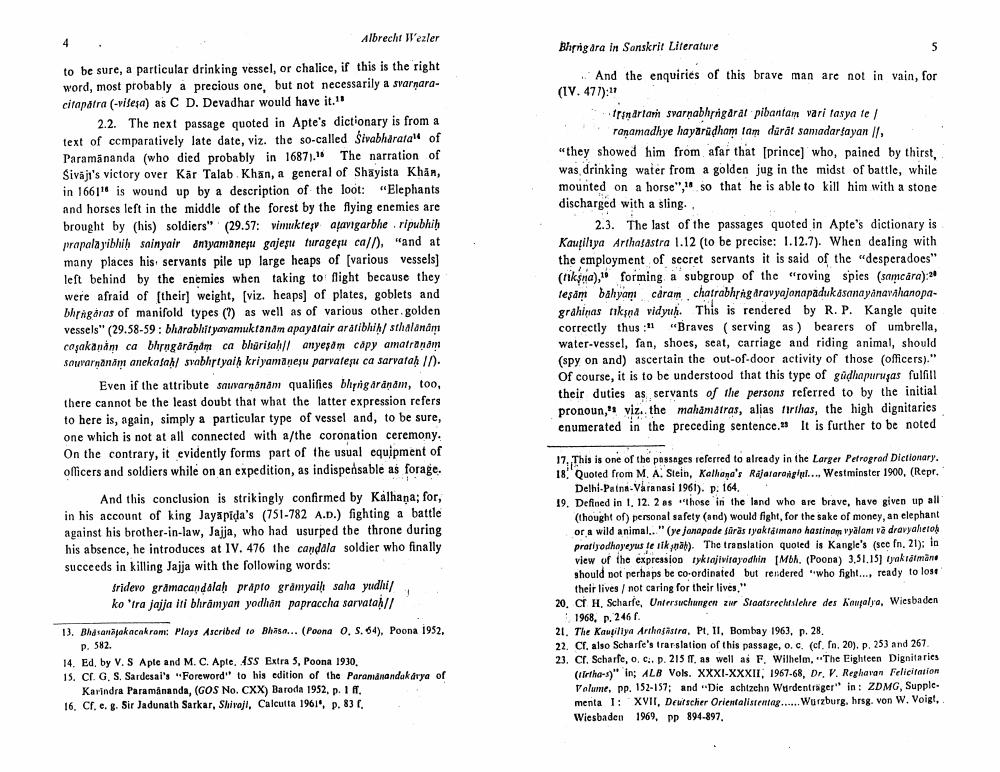Book Title: Bhrngara In Sanskrit Literature Author(s): A Wezler Publisher: A Wezler View full book textPage 3
________________ Albrecht Wezler Bhrrigara in Sanskrit Literature to be sure, a particular drinking vessel, or chalice, if this is the right word, most probably a precious one, but not necessarily a svarnaracitapatra (-vilesa) as C D. Devadhar would have it." 2.2. The next passage quoted in Apte's dictionary is from a text of comparatively late date, viz. the so-called Sivabharataw of Paramānanda (who died probably in 1687). The narration of Sivaji's victory over Kär Talab Khan, a general of Shayista Khan, in 1661" is wound up by a description of the loot: "Elephants and horses left in the middle of the forest by the flying enemies are brought by (his) soldiers" (29.57: vimukter afavigarbhe ripubhih prapalayibhib sainyair Iniyamanesu gajesu turagepu ca//). "and at many places his servants pile up large heaps of various vessels] left behind by the enemies when taking to fight because they were afraid of [their] weight, (viz. heaps) of plates, goblets and Bhrigaras of manifold types (1) as well as of various other golden vessels" (29.58-59: bharabhityavamuktanam apayatair araibhi/ sthalanam capakanam ca bhrngårānam ca barisah/l anyesam copy amatranam souvarnanam anekafah/ svabhrtyaih kriyamanesu parvateu ca sarvatah In. Even if the attribute sauvarnonam qualifies bhungaranam, too, there cannot be the least doubt that what the latter expression refers to here is, again, simply a particular type of vessel and, to be sure, one which is not at all connected with a/the coronation ceremony. On the contrary, it evidently forms part of the usual equipment of officers and soldiers while on an expedition, as indispensable as forage. And the enquiries of this brave man are not in vain, for (IV. 477):"" frindrarh svarnabhrrigaral pibantam vari tasya te / ranamadhye hayaradhom tam dürät sanadarfayan II, "they showed him from afar that [prince) who, pained by thirst, was drinking water from a golden jug in the midst of battle, while mounted on a horse", so that he is able to kill him with a stone discharged with a sling. 2.3. The last of the passages quoted in Apte's dictionary is Kaupilya Arthasastra 1.12 (to be precise: 1.12.7). When dealing with the employment of secret servants it is said of the "desperadoes" (niksria), forming a subgroup of the stoving spies (samcara):* lesam bahyani caram chatrabhigaravyajonapadukasanayanavihanopagrahinas tiks vidyu. This is rendered by R. P. Kangle quite correctly thus :"1 "Braves (serving as ) bearers of umbrella, water-vessel, fan, shoes, seat, carriage and riding animal, should (spy on and) ascertain the out-of-door activity of those officers)." Of course, it is to be understood that this type of gūdhapurugas fulfill their duties as servants of the persons referred to by the initial pronoun," viz. the mahamatras, alias furthas, the high dignitaries enumerated in the preceding sentence. It is further to be noted And this conclusion is strikingly confirmed by Kalhana; for, in his account of king Jayapida's (751-782 A.D.) fighting a battle against his brother-in-law, Jajja, who had usurped the throne during his absence, he introduces at IV. 476 the candela soldier who finally succeeds in killing Jajja with the following words: Sridevo grāmacandalah prapto gramyaih saha yudhi ko 'tra jajja iti bhramyan yodhan papraccha sarvatah// 17. This is one of the passages referred to already in the Larger Petrograd Dictionary. 18 Quoted from M. A. Stein, Kelhena's Rajatarongipil.... Westminster 1900. (Repr. Delhi-Paint-Varanasi 1961). p. 164 19. Defined in 1. 12. 2 as those in the land who are brave, have given up all (thought of) personal safety (and) would fight for the sake of money, an elephant or a wild animal.." (ye janapade füràs tyaktarmano hastinen vyalanı và drevalere pratiyodhayeyus te ilah). The translation quoted is Kangle's (see in, 21)la view of the expression tyktajivitayodhin (Mb. (Poona) 3,51.15) Gyakratmane should not perhaps be co-ordinated but rer.dered "who fight.... ready to lose their lives / not caring for their lives." 20. C H, Scharfe, Untersuchungen zur Staatsrechtslehre des Kowalya, Wiesbaden 1968. p. 246. 21. The Kapillya Arthagistra, Pt. II, Bombay 1963, p. 28. 22. Cf, also Scharfe's translation of this passage, o. c. (cf. fn. 20). p. 253 and 267 23. Cr. Scharfe, o, c., p. 215 as well as F. Wilhelm, The Eighteen Dignitaries (Irtha-sy" in; ALB Vols. XXXI-XXXII, 1967-68, Dr. V. Reghavan Felicitation Volume, pp. 152-157; and Die achtzehn Wurdentrager" in: ZDMG, Supple. menta 1: XVII, Deutscher Orientaliscentag......Wurzburg. hrsg. von W. Voigt, Wiesbaden 1969, PP 894-897, 13. Blanagakacakram Plays Ascribed to Bhasa... (Poona 0, S. 64). Poona 1952. P. 582. 14. Ed, by V. S Aple and M. C. Apte. ASS Extra 5, Poona 1930, is. cr . S, Sardesai's "Foreword to his edition of the Parandanduk dvya of Karindra Paramananda, (GOS No. CXX) Baroda 1952, p. 1 f. 16. Cr.e. 8. Sir Jadunath Sarkar, Shivaji, Calcutta 1961, p. 83.Page Navigation
1 2 3 4 5 6 7 8 9 10 11 12 13 14 15 16 17 18 19 20 21 22 23
